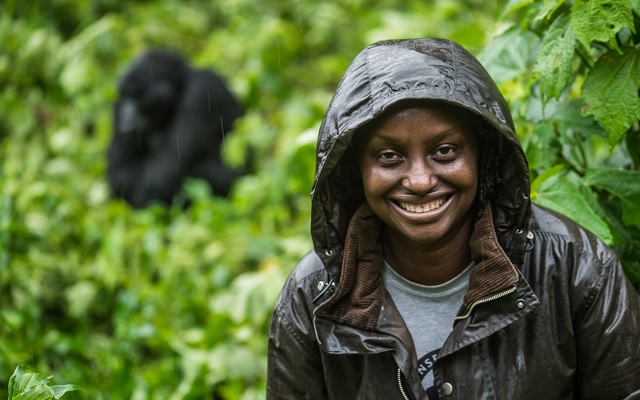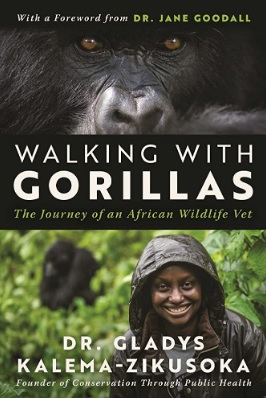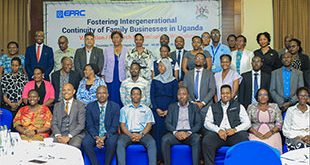
Uganda’s first wildlife veterinarian narrates her love for gorillas and passion for public health
Kampala, Uganda | IAN KATUSIIME | When news broke that Dr. Gladys Kalema-Zikusoka had published her memoir, it sparked excitement because she has dedicated her life to conservation and looking after gorillas. For those who have visited Bwindi Impenetrable National Park to see Uganda’s beautiful mountain gorillas, it was the cherry on top because Bwindi became Dr. Kalema’s second home where she ensured the health of primates and surrounding communities was a shared priority.
Walking With Gorillas is one woman’s intimate journey with animals from a young age to studying veterinary medicine and spending her adult life caring for apes who share a lot with humans.
Dr. Kalema tells her life story with candour, humour and passion. It is a tale of triumph amid varying odds as she grows up without her father; William Kalema, a former minister who was killed by Idi Amin’s soldiers when she was just two years old. Her family is also shadowed by the assassination of her mother’s father; Martin Luther Nsibirwa, who was the Katikkiro of Buganda kingdom.
She went to schools in different countries which shaped her worldly outlook and enriched her calling as a conservationist. While attending the Royal Veterinary College, University of London, she met primatologists, veterinarians and delved into research in a field she would pursue as a lifelong career.
Dr. Kalema set up the first veterinary unit at Uganda National Parks (now Uganda Wildlife Authority) after she was hired in 1996. She then embarked onto different missions in Uganda’s various parks; from freeing animals from snares, training rangers on the basics of wildlife health, and collaborating with several experts in the country and beyond on wildlife protection.
She takes the reader into the rarefied world of a wildlife veterinarian that involves “darting” (administering a drug) animals, “translocating” elephants straying from Murchison Falls National Park and doing the same for giraffes in Kenya to restock Kidepo Valley National Park.
While at UWA, she nursed bugger ambitions as working for government was constricting her. She enrolled for a medicine residency program in the U.S. where she developed a plan to set up an organisation where she could pursue her work unhindered.
In 2003, she founded Conservation Through Public Health (CTPH), a non-profit with a “One Health” approach: where the health of the human population is vital for gorilla conservation. Her husband Lawrence Zikusoka is a co-founder and vital partner alongside one of her colleagues, Stephen Rubanga in running CTPH. Twenty years down the road is therefore perfect timing for her memoir.

Since gorillas share 98% of genetic material with humans, Dr. Kalema reckoned that the health of the community in Bwindi should be a major effort to prevent zoonotic disease transmission. As a young vet, she carried out research on Tuberculosis in the area to ensure prevention and proper treatment. Through health education workshops and community engagement in Buhoma, the main tourist site in Bwindi, there were breakthroughs.
When some of the gorillas got scabies, she pointed out that the dirty clothes on scarecrows meant to scare them away were a likely cause.
Walking With Gorillas is inundated with Dr. Kalema’s love for the beasts. Her several trips visiting gorilla groups like Mubare, Nkuringo, Katendegyere; their group dynamics and the fondness with which she writes about individual gorillas like Ruhondeza, Kanyonyi, bear testimony to her intimate connection with the apes. She took her two sons to see the beloved gorillas who then nurtured their own love for the primates.
Habituation of gorillas is a major theme in the book being the basis of gorilla tourism. The animals wander from the park to forage on farms sometimes causing conflict with their human neighbours. To resolve this, CTPH created conflict resolution teams where park neighbours and rangers got trainings to ensure a peaceful co-existence.
In her work, Dr. Kalema collects fecal samples to test for parasites and as a health monitoring tool for the gorillas that remain vulnerable to disease. Early on, she performed surgery on a young gorilla, Kahara, with a rare condition—but before her decision, there was debate among conservationists with fears that the surgery could interfere with nature. Touched by the pain of the young gorilla, she went ahead with the procedure and saved the gorilla’s life to her and everyone’s relief.
The work of CTPH entailed trainings of rangers and the community on how to care for the gorillas as a way of promoting conservation among those most impacted by gorillas. Along the way, CTPH built a vast donor network because of its unique approach to conservation. She has travelled the world as an evangelist for gorilla conservation and won numerous awards like the 2022 Edinburgh Medal for Science and Humanity and the 2021 UN Champion of the Earth Award.
The outbreak of Covid19 was a test for Dr. Kalema personally and her work protecting gorillas due to its easy spread. Her own battle with the virus made her think deeply about her legacy resulting into the effort to pen the book.
Dr. Kalema’s prose, clarity and vivid narrative is a channel to an engrossing life story. Walking With Gorillas leaves the reader with a new found appreciation for conservation.
 The Independent Uganda: You get the Truth we Pay the Price
The Independent Uganda: You get the Truth we Pay the Price






Good story. Bless her. Ugandans like her are very rare and not easy to come across